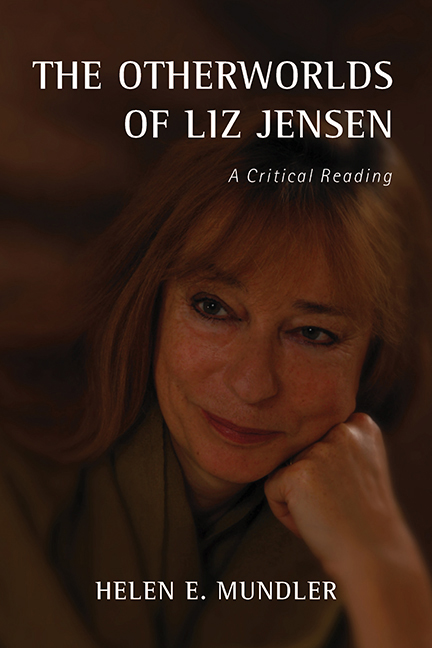Book contents
- Frontmatter
- Dedication
- Contents
- Acknowledgements
- List of Abbreviations
- Introduction
- 1 Egg Dancing: Paving the Way for Otherworlds in Time and Space
- 2 Ark Baby and the Return to the Nineteenth Century
- 3 Island Life: The Pure “Ustopia” of The Paper Eater
- 4 Liz Jensen's Murder Mysteries
- 5 From Family Romance to the Detective Novel
- 6 New Rules, New Otherworlds: Jensen's “Third Wave”
- 7 Ecofiction, Rapture Fiction
- 8 The Uninvited: The Most Radically “Other” World to Date
- Conclusion
- Notes
- Bibliography
- Index
4 - Liz Jensen's Murder Mysteries
Published online by Cambridge University Press: 09 May 2017
- Frontmatter
- Dedication
- Contents
- Acknowledgements
- List of Abbreviations
- Introduction
- 1 Egg Dancing: Paving the Way for Otherworlds in Time and Space
- 2 Ark Baby and the Return to the Nineteenth Century
- 3 Island Life: The Pure “Ustopia” of The Paper Eater
- 4 Liz Jensen's Murder Mysteries
- 5 From Family Romance to the Detective Novel
- 6 New Rules, New Otherworlds: Jensen's “Third Wave”
- 7 Ecofiction, Rapture Fiction
- 8 The Uninvited: The Most Radically “Other” World to Date
- Conclusion
- Notes
- Bibliography
- Index
Summary
Ventriloquized Voices
WAR CRIMES FOR THE HOME and The Ninth Life of Louis Drax constitute what might be called the second wave of Jensen's work, standing alone in terms of both form and plot. These two novels invite a reading that takes into account their two salient characteristics, ventriloquized voices and the adaptation of the murder-mystery form. While acts of ventriloquy (the creation of a voice that comes from elsewhere, rather than directly from the omniscient narrator) have already been seen in Jensen's work, the play of voice is arguably more marked in the fourth and fifth novels, and questions pertaining to voice itself are foregrounded. The act of ventriloquy is highlighted by recourse to selfreflexive devices: both Gloria and Louis act almost like ventriloquist's dummies as they give voice to discourses that will contribute to the resolution of the mysteries posed by each of these texts. Gloria speaks under hypnosis, and thus somebody else seems to speak through her, and Louis, at the moment he asks the very salient question as to where his father is (not knowing that he is dead), seems like “a puppet, his body operated by a stranger” (LD, 94).
Regarding the adaptation of the form of the murder mystery, these two works develop into entire novels elements that are only touched on elsewhere. In this chapter I will analyze the otherworld that is created through Gloria's voice in War Crimes for the Home, while in chapter 5 I will give a comparative reading of Jensen's two murder mysteries to date.
War as Otherworld
In Liz Jensen's strikingly titled fourth novel, War Crimes for the Home, Gloria Winstanley is a young woman living with her sister, Marjory (“Marje”), in Bristol, at the beginning of the Second World War. Following the unrelated death of their mother and the mobilization of their father to Singapore, the two sisters take up work in a munitions factory. In a parallel narrative, Gloria is rediscovered as an old lady at the turn of the century looking back on her life, which she never ceases to interpret through the prism of war: this remains her defining experience and colors her experience of the world. In her first-person account of the life she has lived, Gloria constantly appropriates the language, and even the ideology, of armed conflict.
- Type
- Chapter
- Information
- The Otherworlds of Liz JensenA Critical Reading, pp. 93 - 109Publisher: Boydell & BrewerPrint publication year: 2016

